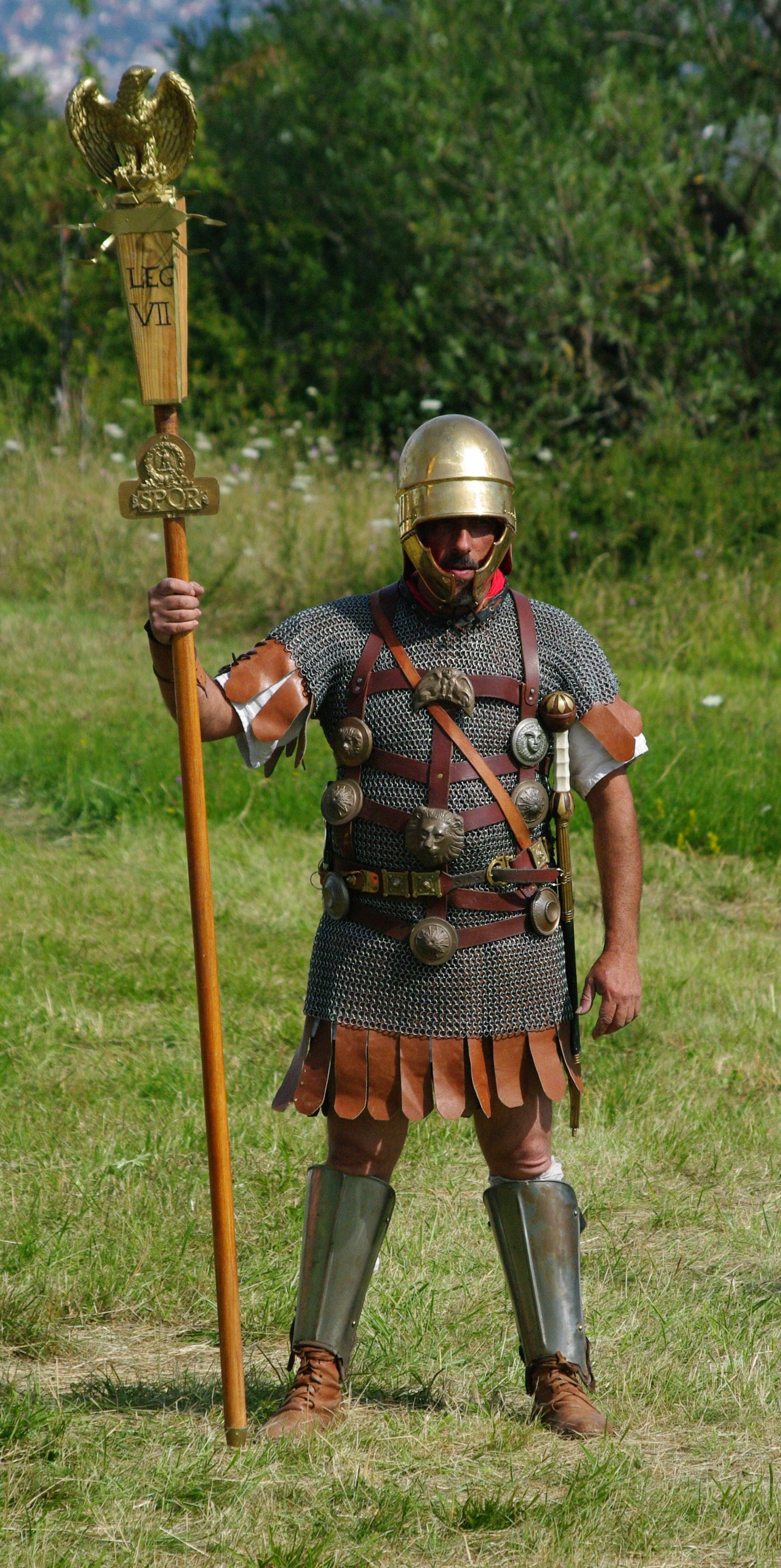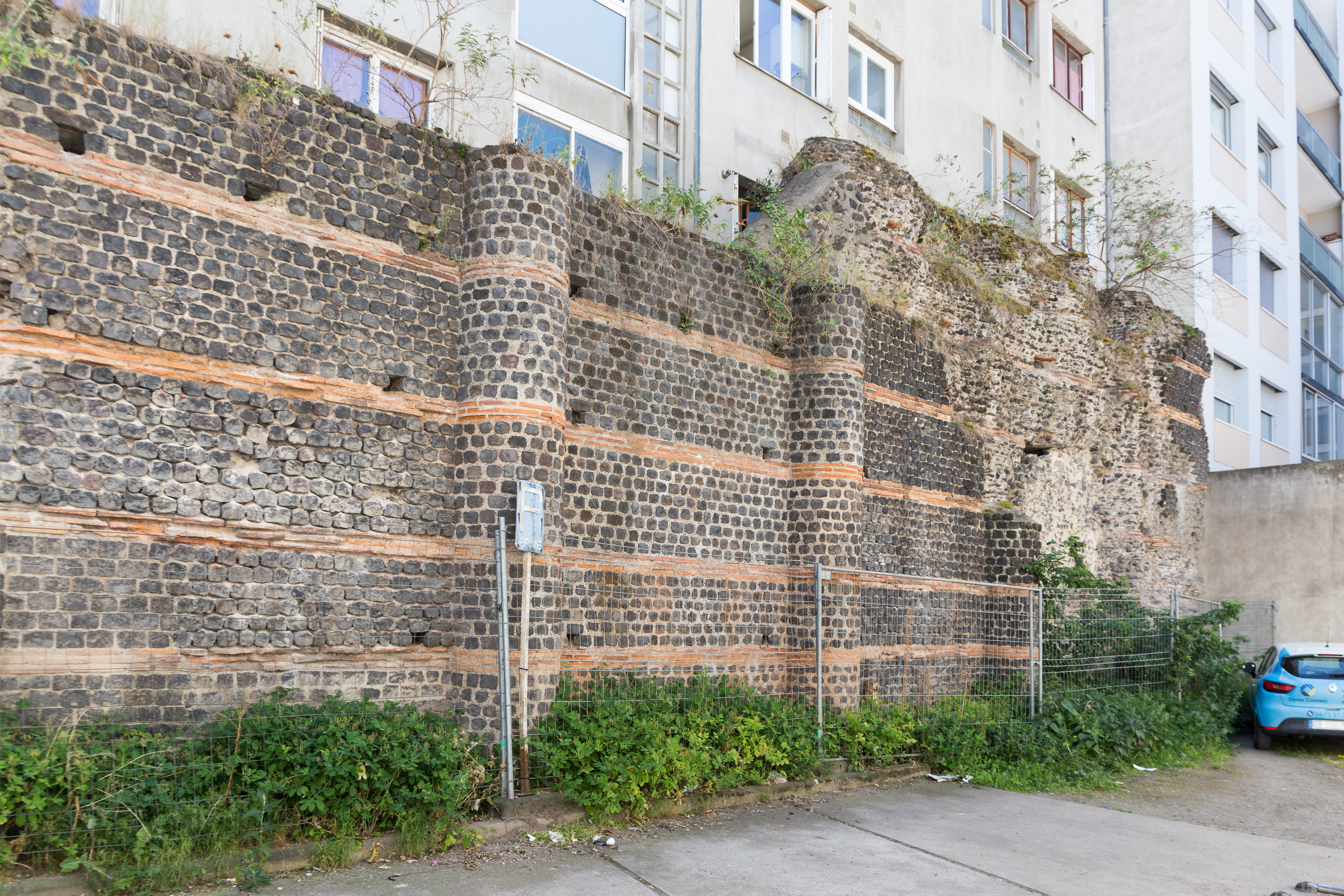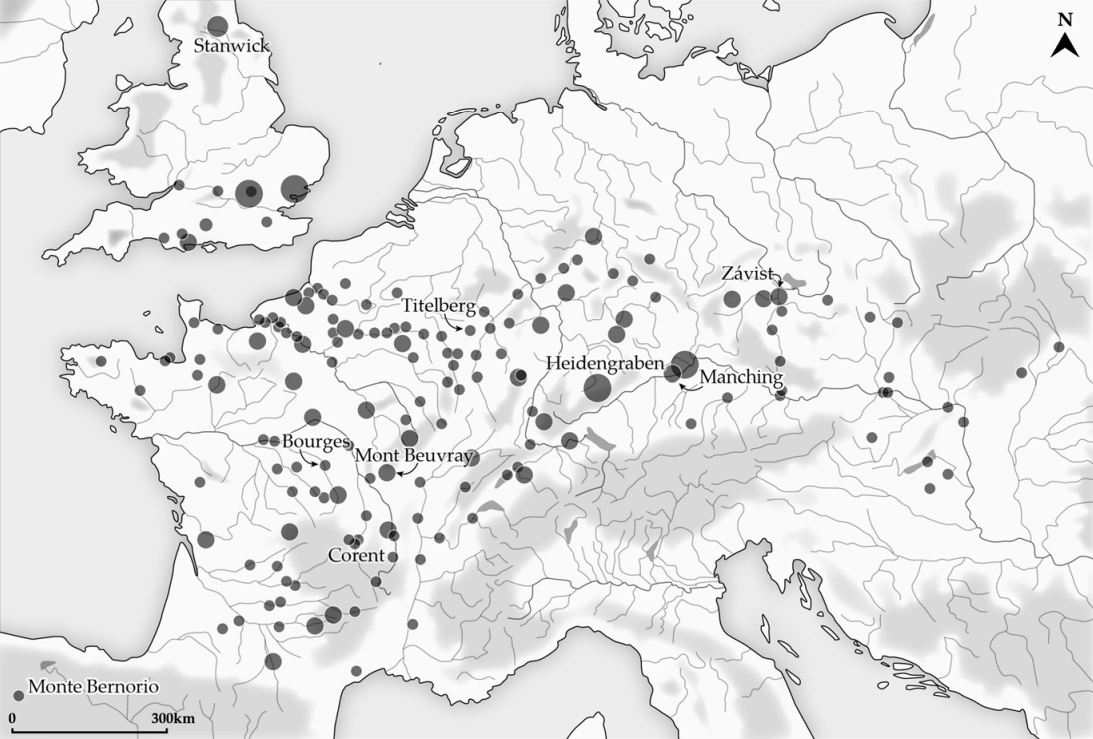|
Gergovia
Gergovia was a Gaulish town in modern Auvergne-Rhône-Alpes in the upper part of the basin of the Allier, near present-day Clermont-Ferrand. It was the capital of the Averni. The city of Gergovia had strong walls and was located on a giant raised plateau surrounded by hills. It was the chief town (oppidum) of the Arverni and the site of the Battle of Gergovia in 52 BC. The battle was fought between a Roman Republic army, led by proconsul Julius Caesar, and Gallic forces led by Vercingetorix. Caesar Gaius Julius Caesar (12 or 13 July 100 BC – 15 March 44 BC) was a Roman general and statesman. A member of the First Triumvirate, Caesar led the Roman armies in the Gallic Wars before defeating his political rival Pompey in a civil war. He ... marched south with six legions to take the hill town of Gergovia. The Gauls won the battle, which led to increased cavalry support for Vercingetorix's campaign for future battles. This was a significant failure in Gallia for Caesar ... [...More Info...] [...Related Items...] OR: [Wikipedia] [Google] [Baidu] |
Battle Of Gergovia
The Battle of Gergovia took place in 52 BC in Gaul at Gergovia, the chief oppidum (fortified town) of the Arverni. The battle was fought between a Roman Republican army, led by proconsul Julius Caesar, and Gallic forces led by Vercingetorix, who was also the Arverni chieftain. The Romans attempted to besiege Gergovia, but miscommunication ruined the Roman plan. The Gallic cavalry counterattacked the confused Romans and sent them to flight, winning the battle. The site is identified with Merdogne, since renamed Gergovie, a village located on a hill within the town of La Roche-Blanche, near Clermont-Ferrand, in south central France. Some walls and earthworks still survive from the pre-Roman Iron Age. The battle is well known in France as an example of a Gallic victory. Prelude As with much of the conflict between Rome and Gaul in the first century BC, information about this battle comes principally from Julius Caesar's '' Commentaries on the Gallic War'' (). There are no s ... [...More Info...] [...Related Items...] OR: [Wikipedia] [Google] [Baidu] |
Vercingetorix
Vercingetorix (; ; – 46 BC) was a Gauls, Gallic king and chieftain of the Arverni tribe who united the Gauls in a failed revolt against Roman Republic, Roman forces during the last phase of Julius Caesar's Gallic Wars. After surrendering to Caesar and spending almost six years in prison, he was executed in Rome. Vercingetorix was the son of Celtillus the Arvernian, leader of the Gallic tribes. Vercingetorix came to power after his formal designation as chieftain of the Arverni at the oppidum Gergovia in 52 BC. He immediately established an alliance with other Gallic tribes, took command, combined all forces and led them in the Celts' most significant revolt against Roman power. He won the Battle of Gergovia against Julius Caesar in which several thousand Romans and their allies were killed and the Roman legions withdrew. Caesar had been able to exploit Gaulish internal divisions to easily subjugate the country, since Vercingetorix's attempt to unite the Gauls against Roman in ... [...More Info...] [...Related Items...] OR: [Wikipedia] [Google] [Baidu] |
Gallic Wars
The Gallic Wars were waged between 58 and 50 BC by the Roman general Julius Caesar against the peoples of Gaul (present-day France, Belgium, and Switzerland). Gauls, Gallic, Germanic peoples, Germanic, and Celtic Britons, Brittonic tribes fought to defend their homelands against an aggressive Roman Military campaign, campaign. The Wars culminated in the decisive Battle of Alesia in 52 BC, in which a complete Roman victory resulted in the expansion of the Roman Republic over the whole of Gaul. Though the collective Gallic armies were as strong as the Roman forces, the Gallic tribes' internal divisions eased victory for Caesar. Gallic chieftain Vercingetorix's attempt to unite the Gauls under a single banner came too late. Caesar portrayed the invasion as being a preemptive and defensive action, but historians agree that he fought the wars primarily to boost his political career and to pay off his debts. Still, Gaul was of significant military importance to the Romans. ... [...More Info...] [...Related Items...] OR: [Wikipedia] [Google] [Baidu] |
Caesar
Gaius Julius Caesar (12 or 13 July 100 BC – 15 March 44 BC) was a Roman general and statesman. A member of the First Triumvirate, Caesar led the Roman armies in the Gallic Wars before defeating his political rival Pompey in a civil war. He subsequently became dictator from 49 BC until his assassination in 44 BC. Caesar played a critical role in the events that led to the demise of the Roman Republic and the rise of the Roman Empire. In 60 BC, Caesar, Crassus, and Pompey formed the First Triumvirate, an informal political alliance that dominated Roman politics for several years. Their attempts to amass political power were opposed by many in the Senate, among them Cato the Younger with the private support of Cicero. Caesar rose to become one of the most powerful politicians in the Roman Republic through a string of military victories in the Gallic Wars, completed by 51 BC, which greatly extended Roman territory. During this time, he both invaded Britain and built a br ... [...More Info...] [...Related Items...] OR: [Wikipedia] [Google] [Baidu] |
Averni
The Arverni (Gaulish: *''Aruernoi'') were a Gallic people dwelling in the modern Auvergne region during the Iron Age and the Roman period. They were one of the most powerful tribes of ancient Gaul, contesting primacy over the region with the neighbouring Aedui. They are mentioned in 207 BC as treating with Carthaginian commandant Hasdrubal Barca. Headed by their chiefs Luernius and Bituitus, the Arverni were at the head of an extensive empire. After Bituitus was defeated by Domitius Ahenobarbus and Fabius Maximus in 121 BC, the Arvernian empire was reduced to suzerainty over some neighbouring tribes. In 52 BC, during the Gallic Wars, the Arvernian chief Vercingetorix led the Gallic revolt against the armies of Caesar. After an initial victory at the Battle of Gergovia, Vercingetorix was defeated by the Romans at the Battle of Alesia, after which the Arverni lost their power of suzerainty. They maintained however a status of '' civitas libera'', and remained a prosperous tri ... [...More Info...] [...Related Items...] OR: [Wikipedia] [Google] [Baidu] |
Arverni
The Arverni (Gaulish: *''Aruernoi'') were a Gallic people dwelling in the modern Auvergne region during the Iron Age and the Roman period. They were one of the most powerful tribes of ancient Gaul, contesting primacy over the region with the neighbouring Aedui. They are mentioned in 207 BC as treating with Carthaginian commandant Hasdrubal Barca. Headed by their chiefs Luernius and Bituitus, the Arverni were at the head of an extensive empire. After Bituitus was defeated by Domitius Ahenobarbus and Fabius Maximus in 121 BC, the Arvernian empire was reduced to suzerainty over some neighbouring tribes. In 52 BC, during the Gallic Wars, the Arvernian chief Vercingetorix led the Gallic revolt against the armies of Caesar. After an initial victory at the Battle of Gergovia, Vercingetorix was defeated by the Romans at the Battle of Alesia, after which the Arverni lost their power of suzerainty. They maintained however a status of '' civitas libera'', and remained a prosperous t ... [...More Info...] [...Related Items...] OR: [Wikipedia] [Google] [Baidu] |
Julius Caesar
Gaius Julius Caesar (12 or 13 July 100 BC – 15 March 44 BC) was a Roman general and statesman. A member of the First Triumvirate, Caesar led the Roman armies in the Gallic Wars before defeating his political rival Pompey in Caesar's civil war, a civil war. He subsequently became Roman dictator, dictator from 49 BC until Assassination of Julius Caesar, his assassination in 44 BC. Caesar played a critical role in Crisis of the Roman Republic, the events that led to the demise of the Roman Republic and the rise of the Roman Empire. In 60 BC, Caesar, Marcus Licinius Crassus, Crassus, and Pompey formed the First Triumvirate, an informal political alliance that dominated Roman politics for several years. Their attempts to amass political power were opposed by many in the Roman Senate, Senate, among them Cato the Younger with the private support of Cicero. Caesar rose to become one of the most powerful politicians in the Roman Republic through a string of military victories in the G ... [...More Info...] [...Related Items...] OR: [Wikipedia] [Google] [Baidu] |
Clermont-Ferrand
Clermont-Ferrand (, , ; or simply ; ) is a city and Communes of France, commune of France, in the Auvergne-Rhône-Alpes regions of France, region, with a population of 147,284 (2020). Its metropolitan area () had 504,157 inhabitants at the 2018 census.Comparateur de territoire: Aire d'attraction des villes 2020 de Clermont-Ferrand (022), Unité urbaine 2020 de Clermont-Ferrand (63701), Commune de Clermont-Ferrand (63113) INSEE It is the Prefectures in France, prefecture (capital) of the Puy-de-Dôme departments of France, département. Olivier Bianchi is its current List of mayors of Clermont-Ferrand, mayor. Clermont-Ferrand sits on the plai ... [...More Info...] [...Related Items...] OR: [Wikipedia] [Google] [Baidu] |
Gaul
Gaul () was a region of Western Europe first clearly described by the Roman people, Romans, encompassing present-day France, Belgium, Luxembourg, and parts of Switzerland, the Netherlands, Germany, and Northern Italy. It covered an area of . According to Julius Caesar, who took control of the region on behalf of the Roman Republic, Gaul was divided into three parts: Gallia Celtica, Gallia Belgica, Belgica, and Gallia Aquitania, Aquitania. Archaeologically, the Gauls were bearers of the La Tène culture during the 5th to 1st centuries BC. This material culture was found throughout Gaul and as far east as modern-day southern Poland, Slovakia, and Hungary. Warbands led by the Gaul Brennus (leader of the Senones), Brennos Battle of the Allia, sacked Rome in 387 BC, becoming the only time Rome was conquered by a foreign enemy in 800 years. However, Gallia Cisalpina was conquered by the Romans in 204 BC and Gallia Narbonensis in 123 BC. Gaul was invaded after 120 BC by the Cimbri ... [...More Info...] [...Related Items...] OR: [Wikipedia] [Google] [Baidu] |
Gallia
Gaul () was a region of Western Europe first clearly described by the Romans, encompassing present-day France, Belgium, Luxembourg, and parts of Switzerland, the Netherlands, Germany, and Northern Italy. It covered an area of . According to Julius Caesar, who took control of the region on behalf of the Roman Republic, Gaul was divided into three parts: Gallia Celtica, Belgica, and Aquitania. Archaeologically, the Gauls were bearers of the La Tène culture during the 5th to 1st centuries BC. This material culture was found throughout Gaul and as far east as modern-day southern Poland, Slovakia, and Hungary. Warbands led by the Gaul Brennos sacked Rome in 387 BC, becoming the only time Rome was conquered by a foreign enemy in 800 years. However, Gallia Cisalpina was conquered by the Romans in 204 BC and Gallia Narbonensis in 123 BC. Gaul was invaded after 120 BC by the Cimbri and the Teutons, who were in turn defeated by the Romans by 103 BC. Julius Caesar finally ... [...More Info...] [...Related Items...] OR: [Wikipedia] [Google] [Baidu] |
52 BC
__NOTOC__ Year 52 BC was a year of the pre-Julian Roman calendar. At the time, it was known as the Year of the Consulship of Pompeius and Scipio (or, less frequently, year 702 ''Ab urbe condita''). The denomination 52 BC for this year has been used since the early medieval period, when the Anno Domini calendar era became the prevalent method in Europe for naming years. Events By place Roman Republic * Consuls: Quintus Caecilius Metellus Pius Scipio Nasica and Gnaeus Pompeius Magnus. * Gnaeus Pompeius marries Cornelia Metella. * Milo is tried for the murder of Clodius. Despite Cicero's legal defence (''Pro Milone'') he is found guilty and exiled in Massilia (modern Marseille). * Last year of Julius Caesar's Gallic Wars: ** March – Siege and capture of Avaricum (Bourges). ** April–May – Siege and repulse from Gergovia. ** July – Battle of the Vingeanne: Julius Caesar rebuffs, with his German auxiliaries, a Gallic cavalry attack of Vercingeto ... [...More Info...] [...Related Items...] OR: [Wikipedia] [Google] [Baidu] |
Oppidum
An ''oppidum'' (: ''oppida'') is a large fortified Iron Age Europe, Iron Age settlement or town. ''Oppida'' are primarily associated with the Celts, Celtic late La Tène culture, emerging during the 2nd and 1st centuries BC, spread across Europe, stretching from British Iron Age, Britain and Iberia in the west to the edge of the Great Hungarian Plain, Hungarian Plain in the east. These settlements continued to be used until the Romans conquered Southern and Western Europe. Many subsequently became Roman-era towns and cities, whilst others were abandoned. In regions north of the rivers Danube and Rhine, such as most of Germania, where the populations remained independent from Rome, ''oppida'' continued to be used into the 1st century AD. Definition is a Latin word meaning 'defended (fortified) administrative centre or town', originally used in reference to non-Roman towns as well as provincial towns under Roman control. The word is derived from the earlier Latin , 'encl ... [...More Info...] [...Related Items...] OR: [Wikipedia] [Google] [Baidu] |









